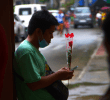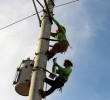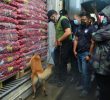Citing cases where additional funding of health programs by the government failed to reduce ailments suffered especially by children in remote villages, Pedro Arnado of peasant group Kilusang Magbubukid ng Pilipinas in Southern Mindanao Region, hopes this one will not again be for naught.
BY KENETTE JEAN I. MILLONDAGA
Davao Today
DAVAO CITY, Philippines — Peasant groups here welcome the inclusion of an additional PHP 600 million (USD 14.43M) to reduce the incidence of Rotavirus diarrhea among small children in the country through vaccination.
The peasant women group Amihan in Southern Mindanao, however, warns against possible abuse of said fund if government is not sincere in implementing the program.
“Siguradohon lang gyud nila nga mahatag na sa mga bata nga hilabihang nagkinahanglan niana ug dili sa korapsyon (They should make sure the fund will go to the children who need it the most and not to corruption),” Malyn Uyanguren, spokesperson of Amihan said.
Citing cases where additional funding of health programs by the government failed to reduce ailments suffered especially by children in remote villages, Pedro Arnado of peasant group Kilusang Magbubukid ng Pilipinas in Southern Mindanao Region, hopes this one will not again be for naught.
“Dako ni nga hagit sa Department of Health nga magmatinud-anon (This is a call for the Department of Health to be truthful in implementing the program),” Arnado said.
The inclusion of Rotavirus vaccination service was announced by President Benigno Aquino III in his July 2012 State of the Nation Address as part of the Expanded Program for Immunization, his administration’s thrust for Universal Health Care and a move toward achieving Millennium Development Goal 4, which is to reduce child mortality by 2015.
The additional vaccination is said to cost the government PHP 600 million and will cater to an estimated 700,000 newborns from the 5.2 million poorest of the poor families identified by the Department of Social Welfare and Development under its National Household Targeting System.
In a media forum Wednesday, Doctor Judith Aguilar of advocacy group Rotavirus Organization for Training and Advocacy in the Philippines said that 1.3 million children worldwide ages zero to five years old die annually due to dehydration caused by diarrhea, and Rotavirus, she cited is the leading cause of diarrhea worldwide.
Aguilar added that 4,745 infants and children die annually in the Philippines or a daily average of 13 deaths.
She cites data that one out of 10 babies is vaccinated against Rotavirus by private physician while the government targets three out of 10 children. However, six more infants and children from zero to five years old, she pointed out, are still at risk of acquiring diarrhea.
“This disease is preventable through vaccination. Improved sanitation or water supply cannot significantly reduce the burden of Rotavirus diarrhea. The most cost effective way to reduce rotavirus diarrhea is through vaccination,” Aguilar added.
Doctor Ashley Lopez of the Davao City Health Office said they offer the vaccine services for free not only among the poorest of the poor but to any “legitimate” resident of Davao City.
He added that the 26 district health offices of the city have been trained to administer the Rotavirus vaccine. (Kenette Jean I. Millondaga/davaotoday.com)
World









